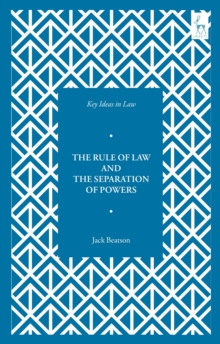Description
| Product ID: | 9781509938773 |
| Product Form: | Paperback / softback |
| Country of Manufacture: | GB |
| Series: | Key Ideas in Law |
| Title: | Key Ideas in Law: The Rule of Law and the Separation of Powers |
| Authors: | Author: Jack Beatson |
| Page Count: | 192 |
| Subjects: | Constitutional and administrative law: general, Constitutional & administrative law, England, Wales |
| Description: | Select Guide Rating Prompted by the events following the 2016 referendum on EU membership and written during the COVID-19 pandemic by one of the leading public lawyers of our day, this book considers two key constitutional principles, the rule of law and separation of powers, by examining the generality, certainty and predictability of law, relations between the different branches of the state, and the mechanisms of accountability within our democracy.Since the referendum and in the light of the restrictions imposed to deal with the pandemic, and the use of guidelines presented as rules to do so, attention has refocused on the relationship and respective powers and competences of the three branches of the state, the legislature, the executive, and the judiciary. They have also placed strains on our unwritten constitution that have been unknown in modern times.The role of the courts and of the rule of law, has been dramatically illustrated by recent litigation, most notably the decisions on whether legislation was needed to serve notice of the UK''s intention to leave the EU and whether the prorogation of the Westminster Parliament in 2019 was a matter for the courts as opposed to a political question for government.Set against this backdrop, the book answers the following questions:- How accessible is the law and how does it avoid arbitrariness?- How is access to justice protected?- How does our constitution reflect the separation of powers and the balance of responsibilities between law and politics?- How does our democracy enable majorities and protect minorities? Prompted by the events following the 2016 referendum on EU membership and written during the COVID-19 pandemic by one of the leading public lawyers of our day, this book considers two key constitutional principles, the rule of law and separation of powers, by examining the generality, certainty and predictability of law, relations between the different branches of the state, and the mechanisms of accountability within our democracy. Since the referendum and in the light of the restrictions imposed to deal with the pandemic, and the use of guidelines presented as rules to do so, attention has refocused on the relationship and respective powers and competences of the three branches of the state, the legislature, the executive, and the judiciary. They have also placed strains on our unwritten constitution that have been unknown in modern times. The role of the courts and of the rule of law, has been dramatically illustrated by recent litigation, most notably the decisions on whether legislation was needed to serve notice of the UK's intention to leave the EU and whether the prorogation of the Westminster Parliament in 2019 was a matter for the courts as opposed to a political question for government. Set against this backdrop, the book answers the following questions:- How accessible is the law and how does it avoid arbitrariness?- How is access to justice protected?- How does our constitution reflect the separation of powers and the balance of responsibilities between law and politics?- How does our democracy enable majorities and protect minorities? |
| Imprint Name: | Hart Publishing |
| Publisher Name: | Bloomsbury Publishing PLC |
| Country of Publication: | GB |
| Publishing Date: | 2021-07-29 |


